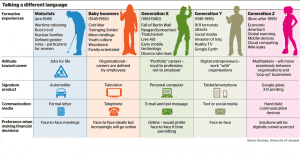We live in a special time; we could say a time of transition. Most significant things are happening now in the world. Natural disasters, war, and the effects of the financial and economic crisis accumulate. Your management style describes the methods used to manage an individual, meeting, project, group of people or organisation.
How do you, manage yourself in a time when:
- Social media has an increasing influence and impact
- New ways of working are rising
- Knowledge in your organisation disappears
- Your role as a leader is going to change?
Table of Contents
Which patterns are broken?
The dramatic events in nature and the economy express to us that we can no longer run operate using old patterns. The more we go on as usual, the more if affects organisations, managers and employees.
Patterns that are broken are those of hierarchy, democracy, politics and power. The point is that you and I must make sure we treat life with respect, equality and compassion again. It’s about editing the cynical; love instead of hate; forgiveness instead of retaliation, and wonder instead of condemnation.
If we do that, are we not too soft as a leader? No, we are just human again.
The new leader
Leaders have in recent years developed themselves into democratic leaders. They respond to the fixed patterns, creating conditions, but stay focused on the organisational interests. Leaders and organisations are suffering, often unconscious, of demoralising old patterns and practices.
At this time more leaders must develop themselves into coaches – coachable leaders.

What is the new management style?
You will be a successful manager if you are more at the service of your employees more. You have a core; a potential to be successful, happy and yourself.
As a manager, by study of your behaviour, inspiration, motivation and passion, you can know how you fulfill your greatest potential. When you encourage your employees to do that same research, they will turn out to be capital. Your employees are not to be defined as cost, more as Human Capital.
In your role as “coach” be open and yourself. Share your insecurities, successes and mistakes. Admit if, you act out of ego, power or status. This is in fact very human, but we do not like to admit it. Work with no hidden agenda. Do not be tempted into political games and hierarchical structures. Keep short, flat lines.
This all contributes to better engagement and interaction between employees and organisation. This investment in the management style will ultimately result in more satisfaction, time, revenue and profit, and consequently satisfied customers and shareholders also.
Your organisation cannot avoid to respond to the current developments in the economy and world. The new generation of employees will ask for this.
Therefore, you will, as an organisation, remain attractive to your current and potential new employees. It’s time to create together a new successful and growing economy and change your management style.




